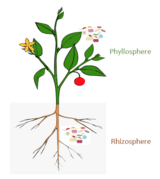| Part of a series on |
| Microbiomes |
|---|
 |
The human virome is the total collection of viruses in and on the human body.[1][2][3] Viruses in the human body may infect both human cells and other microbes such as bacteria (as with bacteriophages).[4] Some viruses cause disease, while others may be asymptomatic. Certain viruses are also integrated into the human genome as proviruses or endogenous viral elements.[1]
Viruses evolve rapidly and hence the human virome changes constantly.[5] Every human being has a unique virome with a unique balance of species.[2][6] Lifestyle, age, geographic location, and even the season of the year can affect an individual's exposure to viruses, and one's susceptibility to any disease that might be caused by those viruses is also affected by pre-existing immunity and both viral and human genetics.[7]
The human virome is far from being completely explored and new viruses are discovered frequently. Unlike the roughly 40 trillion bacteria in a typical human microbiome,[8] an estimate of the number of viral particles in a healthy adult human is not yet available, although virions generally outnumber individual bacteria 10:1 in nature.[9] Studying the virome is thought to provide an understanding of microbes in general and how they affect human health and disease.
In January 2024, biologists reported the discovery of "obelisks", a new class of viroid-like elements, and "oblins", their related group of proteins, in the human microbiome.[10][11]
- ^ a b Wylie, Kristine M.; Weinstock, George M.; Storch, Gregory A. (1 October 2012). "Emerging view of the human virome". Translational Research. 160 (4): 283–290. doi:10.1016/j.trsl.2012.03.006. PMC 3701101. PMID 22683423.
- ^ a b Williams, S. C. P. (6 February 2013). "The other microbiome". Proceedings of the National Academy of Sciences. 110 (8): 2682–2684. Bibcode:2013PNAS..110.2682W. doi:10.1073/pnas.1300923110. PMC 3581985. PMID 23388628.
- ^ Fontana, Judith M.; Alexander, Elizabeth; Salvatore, Mirella (2012). "Translational research in infectious disease: current paradigms and challenges ahead". Translational Research. 159 (6): 430–453. doi:10.1016/j.trsl.2011.12.009. PMC 3361696. PMID 22633095.
- ^ Pride, David T; Salzman, Julia; Haynes, Matthew; Rohwer, Forest; Davis-Long, Clara; White, Richard A; Loomer, Peter; Armitage, Gary C; Relman, David A (8 December 2011). "Evidence of a robust resident bacteriophage population revealed through analysis of the human salivary virome". The ISME Journal. 6 (5): 915–926. doi:10.1038/ismej.2011.169. PMC 3329113. PMID 22158393.
- ^ Woolhouse, M.; Scott, F.; Hudson, Z.; Howey, R.; Chase-Topping, M. (10 September 2012). "Human viruses: discovery and emergence". Philosophical Transactions of the Royal Society B: Biological Sciences. 367 (1604): 2864–2871. doi:10.1098/rstb.2011.0354. PMC 3427559. PMID 22966141.
- ^ Zimmer, Carl (8 February 2013). "Your Inner Lions: Get to Know Your Virome". National Geographic. Archived from the original on February 10, 2013. Retrieved 29 April 2013.
- ^ Delwart, Eric; Racaniello, Vincent (14 February 2013). "A Roadmap to the Human Virome". PLOS Pathogens. 9 (2): e1003146. doi:10.1371/journal.ppat.1003146. PMC 3573120. PMID 23457428.
- ^ Sender, R; Fuchs, S; Milo, R (January 2016). "Are We Really Vastly Outnumbered? Revisiting the Ratio of Bacterial to Host Cells in Humans". Cell. 164 (3): 337–40. doi:10.1016/j.cell.2016.01.013. PMID 26824647.
- ^ "Meet the trillions of viruses that make up your virome | EarthSky.org". earthsky.org. 11 October 2018. Retrieved 2020-10-10.
- ^ Koumoundouros, Tessa (29 January 2024). "'Obelisks': Entirely New Class of Life Has Been Found in The Human Digestive System". ScienceAlert. Archived from the original on 29 January 2024. Retrieved 29 January 2024.
- ^ Zheludev, Ivan N.; et al. (21 January 2024). "Viroid-like colonists of human microbiomes". bioRxiv: 2024.01.20.576352. doi:10.1101/2024.01.20.576352. PMC 10827157. PMID 38293115. Archived from the original on 29 January 2024. Retrieved 29 January 2024.
© MMXXIII Rich X Search. We shall prevail. All rights reserved. Rich X Search
